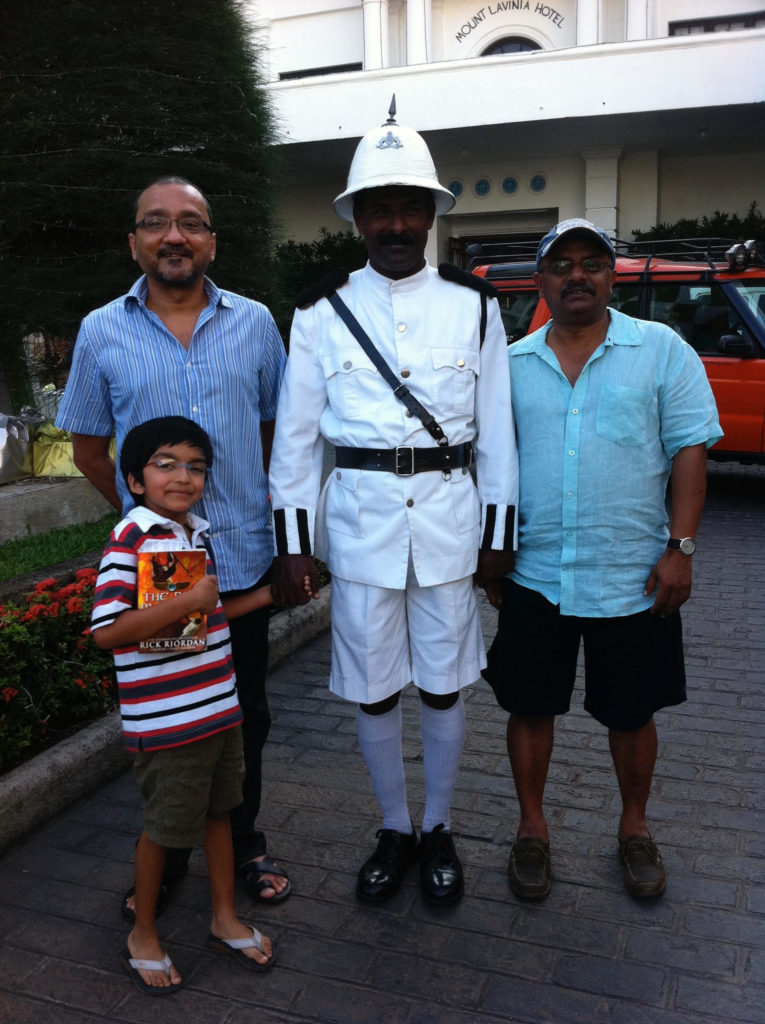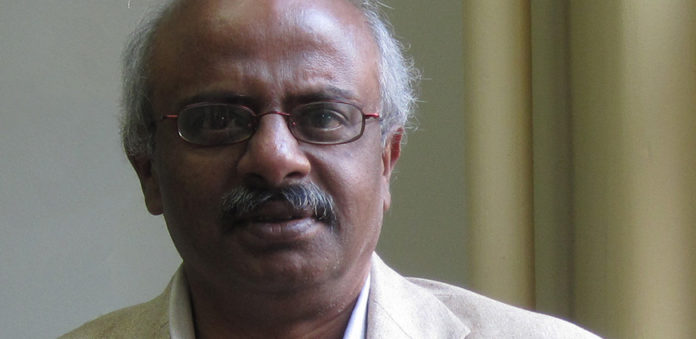by Aamir R. Mufti
~
Sometime during the last week of May, 2021, my dear friend Qadri Ismail “shuffled off this mortal coil” in his apartment in Minneapolis. He was 59 years old and Professor of English at the University of Minnesota. Shuffled off this mortal coil—this strained and irreverent Shakespearean diction would have, I think, pleased and amused him, because he (like me) had received an early education anchored in a colonial concept of English literature, a concept each of us had learned to revile and treat with heavy irony. But his love of John Donne and the Metaphysical poets, and mine of George Eliot and the Victorian novelists, was abiding. To be willing to love what you also hold in contempt—we recognized this strange cultural attitude in each other more or less instantaneously.
We met at Columbia University in 1989. I was a first year graduate student in the Department of English and Comparative Literature after abandoning a graduate career in anthropology, and Qadri had just started an MA in international studies as a Fulbright scholar, which he himself abandoned two years later to move to English. Each of us recognized a kindred spirit in the other. We had grown up in different parts of South Asia, fifteen hundred miles and more away from each other and in very different cultural contexts—he in Colombo, me in Karachi. But we shared an almost physical revulsion for the nationalisms and nation-states of our region. As a political reporter and columnist in Sri Lanka, he had lived through the brutal civil war between militants of the Tamil-Hindu minority and the Sinhalese-Buddhist dominated state. And my entire life had been shaped by the partition of British India along religio-national lines many years before my birth, my family having been part of the accompanying transfer of populations.
I don’t think I’ve known anyone to take writing as a responsibility as seriously as Qadri did, with the possible exception of Edward Said. Soon after we met in New York, the editor of a locally based academic journal (which I later joined) asked Qadri and me to contribute essays concerning the so-called Rushdie Affair, the Islamic protests worldwide against the novelist for writing a novel, The Satanic Verses, which the protestors, and ultimately Ayatollah Khomeini, believed to be blasphemous toward the Prophet of Islam. (The invitation came at the post-midnight tail-end of a party—many of the most memorable experiences involving Qadri came at that witching hour.) I had an MA essay on the topic I could further develop. Qadri wrote from scratch at journalist speed and produced a hard-hitting piece defending Rushdie against his Islamist detractors, but I procrastinated in my usual way, taking months to sort out what I wanted to do with the essay.
One evening Qadri came for dinner to the Victorian rowhouse in Harlem where I rented a room and, on his way out, stopped in the dark hallway and started berating me for taking so long with the essay. “Why should I bother with you,” he said, “if you’re not going to do your work?” (The definite article and an expletive separated the first two words in that sentence.) It was not a casual remark. It was pointed, meant to have an effect, and effectual it certainly was: it shook me to the core. I returned to the essay with an almost panicked sense of urgency and completed it in a few weeks. It was my first academic publication—so, at the very beginning of my writing career, there was Qadri.
I was so traumatized by the brutal directness of his chastisement, it took me some time to realize that it was a gesture of friendship, a slap to the back of the head of a friend, an admonition to get my act together for my own sake. Qadri was equally legendary for making new friends with remarkable ease as he was for “abiding by” old ones. I take this phrase from his own writing, where he turned it into a concept of the complex political and ethical responsibilities of Global North scholarship concerning Global South societies.
This first academic book of his, Abiding by Sri Lanka: On Peace, Place, and Postcoloniality (Minnesota, 2005), examined the ways in which disciplines like history and anthropology conceive of “ethnic conflicts” in postcolonial societies like Sri Lanka and argued that in one way or another, they reproduce and enforce the dominant nationalist approaches to the question of identity and social cohesion. His second work, Culture and Eurocentrism (Rowman & Littlefield, 2015), takes as its focus the concept of culture as it appeared and became established in Anglo-America in the course of the long nineteenth century. Nationalisms worldwide have based their claim to represent society as a whole on the basis of a supposedly shared and uniform culture. Qadri’s work exposed this claim to reveal the colonial origins of the very concept of culture. His death left two more book projects at various stages of completion: one, a study of the U.S. Declaration of Independence as (fascinatingly) an immigrant document, and the other an extended essay, inspired by C.L.R. James’s magisterial book, Beyond a Boundary, on the relation of cricket to Sri Lankan culture and society.
Despite teaching in the U.S. and publishing his books with American publishers, Qadri seemed to care not a fig about the protocols of professional development in this country. Consequently, I suspect that most gatekeepers of the profession in America are largely unaware of his corpus of writing. But, for the Sri Lankan reading public he addressed often directly in both his journalism and the scholarship, and for a wider group of Global South humanities scholars in many parts of the world—India, Pakistan, Sri Lanka, South Africa—his death means the premature removal from our midst of a first class and uncompromising critical mind.
He and I never explicitly discussed this, but I like to think that our academic writings constituted something like a shared project: a critique of the cultural claims and hierarchies of majoritarianism and the nation-state, a critique, in fact, of all identitarian logics, and an insistence on honoring the secular and worldly nature of human life. “Minority” was for Qadri, as it is for me, not the affirmation of this or that sectional identity but rather a space for the questioning of dominant ideas and narratives of social life, a space which, in principle, anyone can come to inhabit. Of course we had strong intellectual differences, expressed freely and often, in robust arguments. I felt that his enthusiasm for theoretical critique was not always accompanied by a skepticism about the lack of historical and political self-reflection in the institution of Euro-American theory. And he thought that I was sometimes hopelessly naive in the manner of my continued attachment to questions concerning the aesthetic, the philological, and the historical.
In our shared New York years, Qadri’s generosity was a fabled thing. Late evenings routinely gravitated toward Qadri’s tiny student apartment. Typically, sometime after midnight a group of us regulars would stagger in, Qadri having also picked up a straggler or two along the way. Then, in no time, after putting on some music, which, in my recollection, was often Bob Marley or Miriam Makeba, he would disappear into the kitchen and eventually produce a beautiful Sri Lankan meal for five, six, seven—a fiery curry, steamed rice or “string hoppers,” yellow “milk daal,” accompanied by a range of sambol and pachadi condiments. Somehow, he managed to do this without missing out on the many conversations going on at once in the apartment. From time to time, he would stomp out of the kitchen and, right arm pointedly raised, forcefully declaim to the entire company his position on the topic of the moment, before returning to work on the meal just as abruptly.

He repeatedly told me and others over the years that he loved my beef nihari, a strangely alluring dish tied to the traditional culture of the historical, walled city of Delhi. And I adored these beef, lamb, fish, or chicken curry meals from Sri Lanka. Food was central to our friendship. For someone to “eat my food, machang,” as he often put it, using the beautiful Sri Lankan word for friend, mate, or companion, which he popularized among us—it is used by both Sinhala and Tamil speakers, I believe—was an almost sacred commitment to all the ties and obligations of friendship. At the center of his life, there was this ethics and politics of friendship. If there was anything truly sacred, that was it. It is not an accident that the one word all his non-Sri Lankan friends associate most with him is this (for us) foreign word meaning “friend.”
The conversations that took place in Qadri’s apartment were addictive and transformational. Funny though it may seem to those who were present, I think it would not be an exaggeration to say that he presided over a salon, but a sort of counter-salon, where discussion took “contrapuntal” form, in Edward Said’s sense of that word, restless and international, ranging across vast distances, histories, cultures. It seemed like we talked about the politics and culture of every nook and cranny of the world. The living room often resembled the forecastle deck of the whaling ship Pequod in Herman Melville’s Moby-Dick: India, Pakistan, Sri Lanka, Malaysia, Ireland, Palestine, South Africa, Singapore, New Zealand, different regions of the U.S., France, England, and many other places—it was as if every corner of the world had sent its representatives.
I met extraordinary people in that apartment—many, who were simply passing through, only once. As for our cohort of graduate students in different disciplines at Columbia, we were, as I see it, lasting influences on each other’s intellectual lives. These new friends and colleagues were some of the most brilliant people I had ever met, and Qadri brought us all together regularly through his extreme form of conviviality. I think it was an extraordinary and perhaps unrepeatable moment in the history of the English department and the humanities sector of the university. In later years, Said used to speak of this period that way—“when the graduate students started coming,” he would say. Each of us who came up through that period bears a responsibility to live up to its expectations. Qadri certainly did.
This entire experience of encounters in Qadri’s living room provided a remarkable education about the world, one for which you cannot but be grateful for the rest of your life. I learnt at least as much in these discussions and arguments as I did in the formal graduate seminars, and possibly more. The arguments could be fierce, even ruthless. Everyone had opinions. Of course there was competitiveness, and sometimes, feelings could be hurt. We also had to put up with the overflow from the toxic, baronial conflicts between some of the senior faculty. I personally didn’t care much about any of that and wasn’t affected by it, though that wasn’t true for all of us. In any case, Qadri’s apartment, and our other gathering places, were to a great extent a respite from that silliness. The point of the conversations was to challenge each other, test our ideas, share our bits of knowledge. One evening I flippantly said to a South African visitor I was meeting for the first time, “Afrikaans is the oppressor’s language.” (This was sometime during the transition from the apartheid regime.) The person was of the mixed-race community of Cape Town, and Afrikaans was his native tongue. What I got in response was a fiercely delivered lesson in the politics of language in South Africa, and by implication the colonial politics of language as such, that still informs my thinking on the subject. Qadri was amused by the thrashing I received.
Despite the accident of naming—to stay with the Moby-Dick analogy—Qadri was almost certainly the Ahab of this motley crew of women and men, than its Ishmael. We always joked about the hint of monomania to his personality, but that singularity of focus was directed toward the possibilities for joy in companionship, the creative energies and drives of human lives. When I met him, I was a bit at sea in the world and had, in particular, lost a creative relationship to my origins in South Asia. It was Qadri and another new friend of this period in my life, of Indian origin, who led me back bit by bit to a critical engagement with the question of origins. It was an incalculable gift for which I shall never stop being grateful to either of them. Like Qadri and I, many of us were displaced from our places of origin and struggling to recalibrate a relationship to home without succumbing to national sentimentality or aspiring to American cosmopolitanism.
A friend recently said to me that Qadri and I both affected each other’s lives in significant ways. But the truth is that he affected mine profoundly. I don’t know if I ever said that to him directly, though I doubt it. It feels so ridiculous now that we didn’t speak to each other that way, but I desperately hope that he knew it.
No doubt there was an element of the Rabelaisian about Qadri—big appetites, forceful rejection of primness, propriety, or pomposity, a raucous sense of humor, a fantastically foul mouth. The most baroque cuss involving one’s siblings or parents would leave his lips transformed into a profession of affection, even love. In all these years I didn’t once see anyone whose relatives were being thus maligned not smile or even grin and feel loved. It was commonplace in our relationship that one of us would start laughing in anticipation the very moment it was apparent that the other was about to make a funny remark or start telling an amusing story. Qadri’s spectacularly incongruent nickname for Said was Eddie Baby.
I mourn my friend, I rage at his absence, I am remorseful for all the missed opportunities. But no one who wishes to honor Qadri’s life can allow themselves to wallow in grief or self-pity for very long, as a mutual friend from Ireland rightly reminded me. Qadri’s real legacy for his friends is his profane love of life, love of friendship and conversation, love of food and the sharing of food. These were, as I see it, at the core of his being and inspired his writing. It is for this I want to remember him.
I shall never again be able to cook nihari without thinking of Qadri.





I didn’t know who he was, must have been a wonderful soul. The beautiful prose, with its inherent sentimentality, is beautiful tribute of a life lived well.